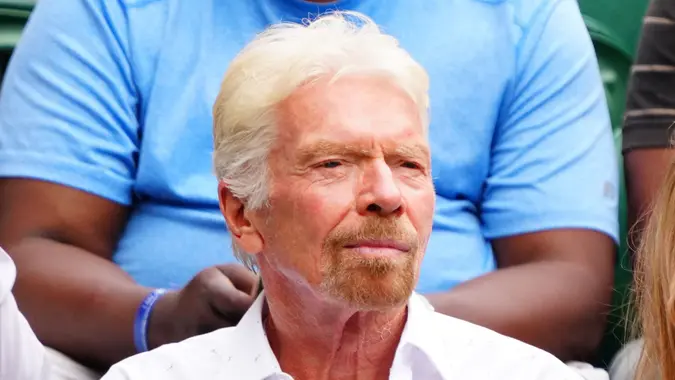3 Reasons Billionaire Richard Branson Thinks Trump’s Tariffs Could Do Major Damage

Commitment to Our Readers
GOBankingRates' editorial team is committed to bringing you unbiased reviews and information. We use data-driven methodologies to evaluate financial products and services - our reviews and ratings are not influenced by advertisers. You can read more about our editorial guidelines and our products and services review methodology.

20 Years
Helping You Live Richer

Reviewed
by Experts

Trusted by
Millions of Readers
President Donald Trump’s sweeping tariff plans remain seemingly erratic, as bold proclamations about new tariffs are often followed by delays and backpedaling. No matter how his plans eventually unfold, plenty of business leaders have sounded off against tariffs — including British billionaire Richard Branson.
Read Next: How Middle-Class Earners Are Quietly Becoming Millionaires — and How You Can, Too
“It’s just such a pity, because everything was going so bloody well up to about three months ago,” Branson said at a recent event at London’s Heathrow Airport.
Branson has made no secret of his opposition to tariffs, calling them a “mistake” that could lead to trade wars, inflation and a weaker global economy, Fortune reported. The co-founder of the Virgin Group also said Trump’s policy is “erratic and unpredictable” and a threat to what has been a strong global economy.
Inflation Fears
Branson’s main fear — and one shared by many — is that steep and sweeping tariffs will lead to higher consumer prices. The argument is that when manufacturers, distributors and importers get hit with steep tariffs, they’ll simply raise the prices of their own goods and services.
Branson knows from personal experience how tariffs can impact the economy. He told the Heathrow gathering that Virgin has already seen a slowdown at the company’s airline, health club and cruise line businesses.
“Inflation hasn’t started kicking in in America,” he said. “It will once these tariffs start kicking in.”
Branson also addressed Trump’s recent attack on Federal Reserve Chairman Jerome Powell, whose fear of tariff-related inflation has kept him from lowering interest rates — something Trump clearly wants.
“If Powell reduces interest rates, inflation will get even worse, so it’s unlikely that he is going to do what Trump wishes there,” Branson said.
‘Economic Nuclear War?’
Branson is among a growing number of corporate and business leaders to push back against the Trump tariffs. Even those who supported Trump during the 2024 election — like billionaire investor Bill Ackman, CEO of Pershing Square Capital Management — have sounded the alarm.
In an April 6 post on X, Ackman briefly complimented Trump for “elevating” the tariff issue and spotlighting nations that have “taken advantage of the U.S.” by using tariffs to protect their own industries. However, then Ackman quickly pivoted to an attack on Trump’s specific tariff proposals.
“By placing massive and disproportionate tariffs on our friends and our enemies alike and thereby launching a global economic war against the whole world at once, we are in the process of destroying confidence in our country as a trading partner, as a place to do business, and as a market to invest capital,” Ackman wrote.
He also posed this question: “What CEO and what board of directors will be comfortable making large, long-term, economic commitments in our country in the middle of an economic nuclear war?”
Growing Risk of Recession
As CNN reported, other billionaire corporate leaders to raise concerns about Trump’s tariffs include Ken Fisher, founder and executive chairman of Fisher Investments; Stanley Druckenmiller, founder of the Duquesne Family Office; and Jamie Dimon, CEO of JPMorgan Chase.
“The recent tariffs will likely increase inflation and are causing many to consider a greater probability of a recession,” Dimon recently wrote in an annual letter to shareholders.
Editor’s note on political coverage: GOBankingRates is nonpartisan and strives to cover all aspects of the economy objectively and present balanced reports on politically focused finance stories. You can find more coverage of this topic on GOBankingRates.com.
More From GOBankingRates
Sources
 Written by
Written by  Edited by
Edited by 

























